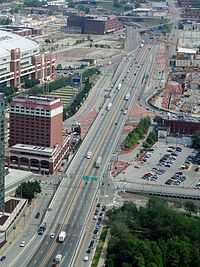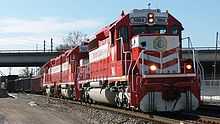Transportation in St. Louis

Transportation in St. Louis, Missouri includes road, rail, ship, and air transportation modes connecting the city of St. Louis with surrounding communities in Greater St. Louis, national transportation networks, and international locations. The city of St. Louis also supports a public transportation network that includes bus and light rail service.
Roads and highways
The city of St. Louis contains four interstate highways that connect to a larger regional highway system. Interstate 70, an east-west highway, runs roughly from the northwest corner of the city to downtown St. Louis. The north-south Interstate 55 enters the city at the south near the Carondelet neighborhood and runs toward the center of the city, and both Interstate 64 and Interstate 44 enter the city on the west, running parallel to the east. Three of the four interstates (Interstates 55, 64, and 70) merge south of the Jefferson National Expansion Memorial and leave the city on the Poplar Street Bridge into Illinois, while Interstate 44 terminates at Interstate 55, just before Intertates 55's intersection with Interstates 64 and 70.
The city of St. Louis also has several major roadways, including the north-south Memorial Drive, located on the western edge of the Jefferson National Expansion Memorial and parallel to Interstate 70, the north-south streets of Grand Boulevard and Jefferson Avenue, both of which run the length of the city, and Gravois Road, which runs from the southeastern portion of the city to downtown and formerly was signed as U.S. Route 66. An east-west roadway that connects the city with surrounding communities is Martin Luther King, Jr. Drive, which carries traffic from the western edge of the city to downtown.
River transport
River transportation is available through the Port of St. Louis, which is 19.3 miles of riverbank on the Mississippi River that handles more than 32 million tons of freight annually. The Port is the 2nd largest inland port by trip-ton miles, and the 3rd largest by tonnage in the United States, with more than one hundred docking facilities for barge shipping and 16 public terminals on the river.[1][2] The Port Authority added 2 new small fire and rescue craft in 2012 and 2013.
Light rail

Light rail service in the city of St. Louis consists of two lines operating on double track servicing the same stations in the city, although branching to different destinations outside the city. Both lines enter the city north of Forest Park on the western edge of the city or on the Eads Bridge in downtown St. Louis to Illinois. All of the system track is in independent right of way, with both surface level and underground subways track in the city. All stations are independent entry, while all platforms are flush-level with trains. Rail service is provided by the Bi-State Development Agency (also known as Metro), which is funded by a sales taxes levied in the city and other counties in the region.[3] The Gateway Multimodal Transportation Center acts as the hub station in the city of St. Louis, linking the city's light rail system, local bus system, passenger rail service, and national bus service.
Airports

Lambert St. Louis International Airport, owned and operated by the City of St. Louis, is 11 miles northwest of downtown along I-70 between I-170 and I-270 in St. Louis County. It is the largest and busiest airport in the state. In 2011, the airport saw 255 daily departures to about 90 domestic and international locations and a total of nearly 13,000,000 passengers.[4] The airport serves as a focus city for Southwest Airlines and was a former hub for Trans World Airlines and former focus-city for American Airlines and AmericanConnection.[5] Air cargo transportation is available at Lambert International and at other nearby regional airports, including MidAmerica St. Louis Airport, Spirit of St. Louis Airport, and St. Louis Downtown Airport.
Railroad Service
Passenger
Commuter rail and long-distance passenger train service in the city is provided by Amtrak. All Amtrak trains serving St. Louis use the Gateway Multimodal Transportation Center downtown. Amtrak trains terminating in the city include the Lincoln Service to Chicago, Illinois and the Missouri River Runner to Kansas City, Missouri. St. Louis is an intermediate stop on the Texas Eagle route which provides long distance passenger service between San Antonio, Texas and Chicago, Illinois.[6]
Freight

St. Louis is the nation's third-largest rail hub, moving everything from grain, gravel, crushed stone, prepared foodstuffs, fats, oils, nonmetallic mineral products, alcohol and tobacco products, to motorized vehicles and parts.[7] Freight rail service in St. Louis is provided on tracks owned by Union Pacific, Norfolk Southern, Foster Townsend Rail Logistics - formerly Manufacturers Railway (St. Louis), Terminal Railroad Association of St. Louis, and the BNSF Railway. The Terminal Railroad Association of St. Louis (reporting marks: TRRA) is a switching and terminal railroad jointly-owned by all the major rail carriers in St. Louis. The company operates 30 diesel-electric locomotives to move railcars around the classification yards, deliver railcars to local industries, and ready trains for departure.[8] The TRRA processes and dispatches a significant portion of railroad traffic in the metropolitan area and owns and operates a network of rail bridges and tunnels including the MacArthur Bridge (St. Louis) and the Merchants Bridge.[9] This infrastructure is also used by commuter rail and long-distance passenger trains serving St. Louis.
Primary train classification yards in St. Louis, their approximate location, and the main rail lines or major customers served:
Union Pacific
- Lesperance Yard - Carroll Street & South 1st St., Desoto Subdivision (St. Louis - Poplar Bluff, MO) and Jefferson City Subdivision (St. Louis - Jefferson City, MO)
- 12th Street Yard - South 14th St. & Gratiot St., Desoto Subdivision and Jefferson City Subdivision
Norfolk Southern
- Luther Yard - E. 3rd St. & E. Carrie Ave., St. Louis District (St. Louis - Moberly, MO)[10]
Foster Townsend Rail Logistics - formerly Manufacturers Railway (St. Louis)
- River Yard - Dorcas St. & S. Broadway, Anheuser-Busch Brewery
- Lindenwood Yard - Jamieson Ave. & Arsenal St., Cuba Subdivision (St. Louis - Springfield, MO), River Subdivision (St. Louis - Turrell, AR), and Hannibal Subdivision (St. Louis - Burlington, IA)
- Chouteau Yard - S. Vandeventer Ave & Tower Grove Ave., local industry and interchange with Union Pacific
- North St. Louis Yard - Hall St. & Humboldt Ave., Hannibal Subdivision (St. Louis - Burlington, IA) and local industry
Bus service
Local bus service in the city of St. Louis is provided by the Bi-State Development Agency via MetroBus, with more than 75 routes connecting to MetroLink commuter rail transit and stops in the city and region. The city is also served by Madison County Transit, which connects downtown St. Louis to Madison County, Illinois. National bus service in the city is offered by Greyhound Lines and Amtrak Thruway Motorcoach, with a station at the Gateway Multimodal Transportation Station, and Megabus, with a stop at St. Louis Union Station.
Taxicab service
Taxicab service in the city is provided by private companies regulated by the Metropolitan Taxicab Commission. Rates vary by vehicle type, size, passengers and distance, and by regulation all taxicab fares must be calculated using a taximeter and be payable in cash or credit card.[12] Solicitation by a driver is prohibited, although a taxicab may be hailed on the street or at a stand.
References
- ↑ https://stlouis-mo.gov/government/departments/sldc/slpa/
- ↑ "City of St. Louis Port Authority". Archived from the original on 2007-09-27. Retrieved 2013-09-30.
- ↑ "Metro - Inside MetroLink". Metro. Retrieved 2008-10-29.
- ↑ http://www.flystl.com
- ↑ http://www.flystl.com
- ↑ amtrak.com
- ↑ http://www.missourieconomy.org/pdfs/rail.pdf
- ↑ http://www.terminalrailroad.com/About/TRRAHistory.aspx
- ↑ http://www.terminalrailroad.com
- ↑ http://www.nscorp.com/nscintermodal/Intermodal/System_Info/Terminals/stlouis.html
- ↑ http://sa-jib.org/yahoo_site_admin/assets/docs/BNSF_OR.73142452.pdf
- ↑
| ||||||||||||||||||||||||||||||||||||||||||||||
| ||||||||||||||||||||||
| ||||||||||||||||||